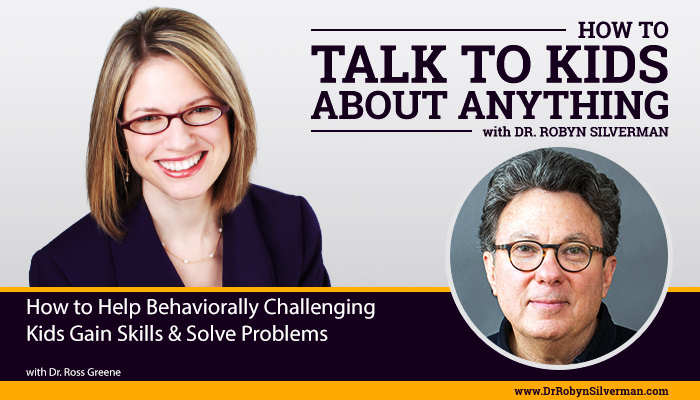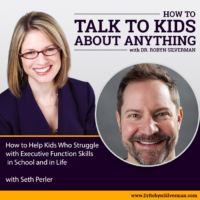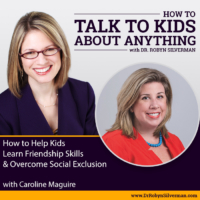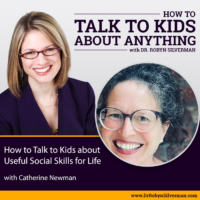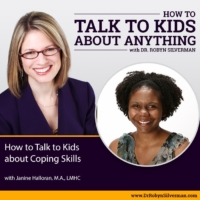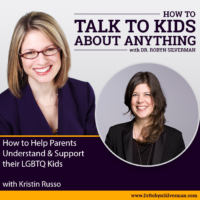Podcast: Play in new window | Download
Subscribe: Apple Podcasts | RSS | More
How to Help Behaviorally-Challenging Kids Gain Skills & Solve Problems
This podcast will focus on how to help all kids— and especially behaviorally-challenging children, to gain lagging skills and solve problems to that they can thrive. Dr. Ross Greene gives us both the strategies and the scripting to work through lagging skills and problem solve, one at a time, so that tantrums and blowouts occur less frequently and life goes more smoothly for everyone.
When I was newly married and still in graduate school for my PhD, I read a book called “The Explosive Child,” and still remember the opening scene talking about a child who had planned to have a waffle in the morning and upon finding out that that waffle was already eaten by a sibling, reacted extremely and explosively. Without children myself at the time, I, of course thought that I wouldn’t possibly have children who would ever tantrum be inflexible— and then, you find yourself in the kitchen years later listening to your child fall apart because his sibling took the broken piece of plastic that was clearly his and you realize “oh. Right. Here we are.”
Because we all see it happen— as parents, educators, coaches. We may not always talk about it— but all kids have moments, from 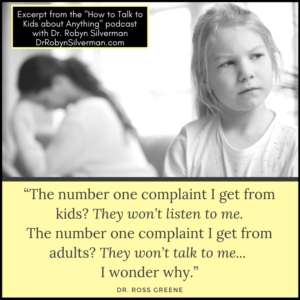 time to time, when they struggle to handle life’s expectations, stick to the routine, follow the plan and do what they are asked— but what about the children with significant behavioral challenges who seem to have more of those moments— moments that can be marked with crying, whining and withdrawing or more extreme behaviors like hitting, kicking, swearing or spitting? How can we help behaviorally challenging children who may be chronically inflexible or easily frustrated to problem solve and thrive at home, in school and in our communities? For this, we will be turning to best selling author and psychologist, Dr. Ross Greene.
time to time, when they struggle to handle life’s expectations, stick to the routine, follow the plan and do what they are asked— but what about the children with significant behavioral challenges who seem to have more of those moments— moments that can be marked with crying, whining and withdrawing or more extreme behaviors like hitting, kicking, swearing or spitting? How can we help behaviorally challenging children who may be chronically inflexible or easily frustrated to problem solve and thrive at home, in school and in our communities? For this, we will be turning to best selling author and psychologist, Dr. Ross Greene.
Dr. Ross Greene served on the faculty at Harvard Medical School for over 20 years, and is now adjunct Associate Professor in the Department of Psychology at Virginia Tech and adjunct Professor in the Faculty of Science at the University of Technology Sydney in Australia. He is the author of the influential, well-known best-selling books The Explosive Child and Lost at School as well as Raising Human Beings, Lost and Found and Lost in School and has helped to bring about an upcoming documentary called “The Kids We Lose.” He is a fierce and articulate advocate for the compassionate understanding and treatment of behaviorally challenging kids and their caregivers. Drawing upon vast clinical and consultation experience and research in the neurosciences, his innovative, research-based Collaborative & Proactive Solutions (CPS) approach – which posits that challenging behavior is the result of lagging skills (rather than lagging motivation) and emphasizes solving problems collaboratively (rather than use of motivational procedures) – has been implemented in countless families and hundreds of schools, inpatient units, and residential and juvenile detention facilities. The Collaborative & Proactive Solutions model helps parents, teachers, and kids work together to solve problems in a way that respects our kids while supporting them in improving their behavior. Dr. Greene is also the founder of Lives in the Balance, which aims to provide resources and programs to caregivers of behaviorally challenging kids, address the issues that cause many of these kids to slip through the cracks; and to promote practices that foster the better side of human nature in all children.
The podcast provides:
- Why kids exhibit challenging behaviors
- Why clear consequences isn’t the final answer
- How to stop doing “Plan A” and start doing “Plan B”
- Why Dr. Greene says “Kids do well when they can.”
- What to do when your child is in the midst of a tantrum or blowout
- Scripting: How to problem solve with your child
- Why just providing the expectations isn’t enough
Important Messages:
- There are a lot of kids who are being mistreated and counterproductive tools being used.
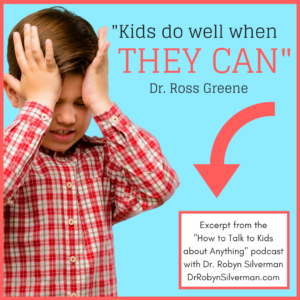
- The poor behavior is signaling that the child is having trouble meeting expectations.
- Research has shown us- the kids who are behaviorally challenging to the extreme are lacking skills NOT motivation.
- Adult imposed consequences do affect behavior- the problem is those interventions are entirely focused on the kid’s behavior. But if behavior is just the signal of lagging skills, then all we are really focused on when we are doing the sticker chart, the time-out, or worse, a spanking, is the signal. But we aren’t solving any of the problems that are causing those signals.
- Plan A (rewards and punishments- adult will- which causes poor behavior), Plan B (problem solving and working on lagging skills- collaboratively as a teammate), Plan C (removing expectations due to prioritizing other important lagging skills and problems for now- if you remove the expectation, you won’t have the behavior).
- Top priority- safety issues. Next, frequency or gravity (greatest negative impact). Pick two or three. Prioritize. Set aside the others until you solve the key, prioritized problems.
- Stay out of the heat of the moment— if you are in it, defuse, de-escalate, keep everybody safe.
- Figure out what the key unsolved problems and lagging skills and the child becomes a highly predictable kid and you will almost never find yourself in the heat of the moment again.
- Plan B (3 steps): (1) Empathy (what’s making it hard?), (2) Define adult concern step (What are the adult’s concerns?), (3) Invitation to problem solve- realistic (both parties can do their part) and mutually satisfactory (the solution addresses the concerns both parties).
- Plan A has been our definition of authority for so long. It is really tragic. You are much more an authority figure when you are working wit the kid to solve problems than when you are imposing your will, becoming the enemy and making it adversarial. This has been unnecessary for so long. If adults have concerns, plan B is going to get them addressed far more durably and farm more reliably than plan A.
- Adults must try the empathy step— and then they are doing this collaboratively rather than going it alone. Problem solving must be done as a team.
- When they don’t know why it’s hard for them: “I’m not mad at you, buddy. I really want to understand why this is hard for you.” Reassure. Be quiet so we leave room for the child to talk (we adults like to talk- come in with theories).
- Five fingers: Five= very true, 4= pretty true, 3= sorta true, 2= not very true, 1= not true at all. (Make statements)
- Sometimes it’s not the kids who aren’t clear about the expectations— it’s the parents who are unclear. Then we need to work on them!
- Most kids— even behaviorally challenging kids- are meeting expectations— what we have to do is identify the ones that they aren’t meeting reliably. And then do Plan B.
- Counterproductive- remind, remind, remind, lower the boom. But what is getting in the kid’s way? Great way to end communication, great way to mess up your relationship with this kid, great way for the kid not to feel heard.
- If “cleaning up their mess” is not a top priority, then we aren’t going to expect him to clean up his mess. If it is a top priority, then it’s Plan B. Not going to solve it in the heat of the moment. If you’ve already come up with solutions and it’s not working, you address it as “remember our solution? Is this a sign that it’s not working- and that we need to revisit?” Otherwise, it hasn’t been identified yet as an unsolved problem.
Notable Quotables:
- “Kids do well when they can.”
- “If we solve the problems that are causing our children’s challenging behavior, instead of modifying the behavior, the problems get solved, the behavior improves and best of all the skills the kid is lacking get taught.”
- Adult imposed consequences do affect behavior- the problem is those interventions are entirely focused on the kid’s behavior. But if behavior is just the signal of lagging skills, then all we are really focused on when we are doing the sticker chart, the time-out, or worse, a spanking, is the signal. But we aren’t solving any of the problems that are causing those signals.
- “Time-outs don’t solve problems and time-outs don’t teach skills. Detentions don’t. Suspensions don’t. Expulsions don’t. Hitting a kid doesn’t. So all of these things we’ve been doing to modify behavior have a pretty decent track record of modifying the behaviors but a terrible track record for solving the problems that are causing those behaviors or teaching kids the skills that they are lacking to change those behaviors.”
- “Here’s the good news: If you solve the problems, the behaviors subside.”
- “We could go after the behaviors and solve and teaching nothing. Or we can solve the problems, teach the skills and improve the behaviors. For me, it’s a three for one sale. A no brainer!”
- “If a kid could do well he would do well.”
- “One of the most important things we can do for a kid, as an adult, is find out why he is having trouble meeting those expectations.”
- “Every kid has an expectation that they are having difficult reliably meeting. It’s just that the behaviorally challenging kids often have many unsolved problems— often 40, 50, 60 unsolved problems.”
- “Caregivers find it more difficult to talk about certain unsolved problems than others but I don’t rank unsolved problems.”
- Adult: “I’ve noticed you’ve had trouble taking the trash out on Tuesday mornings. What’s up?” Child: “I forget.” Drilling strategies (reflect back): “You forget, can you tell me more about that?” Child explains. “Got it. So you want to take the trash out, but you forget that it’s Tuesday and by the time you hear the trash truck, it’s too late. Do I have that right?” Next drilling strategy: Summarize & Ask for more. “Is there anything else making it hard to take out the trash on Tuesday mooring?” (Child explains). Reflect. “Ahh, the trash is stinky- is that what you’re saying?” (child agrees). “And that makes it hard to take the trash out?” (Child agrees). Summarize. “So there are two reasons you have trouble taking the trash out on Tuesdays: you forget and it’s stinky.” Ask for more. “Are there any other reasons you have trouble taking the trash out on Tuesdays?” (Child says no.) Prioritize. “Which of those two would you say is more important? The forgetting or the stinky.” (The forgetting). “Good to know. Let me tell you what my concern is about the difficulty taking out the trash out (Define the adult concern). “If you forget to take the trash out on Tuesday morning, one of two things is going to happen. Either I’ll have to do it or since I think you’re going to do it, the trash just piles up…” Invitation. “I wonder if there’s a way (recap the concerns of both parties) for us to to do something there’s something we can do to make sure you don’t forget to take the trash out on Tuesday mornings and also make sure we don’t have this big pile of trash accumulating outside of our house.” (Give kid first crack- show interested) “Any ideas?” (Child: Is there a way we can remind me?”) “We can remind you. But in the past when I’ve reminded you it hasn’t gone over too well. Is there a way to remind you that wouldn’t annoy you?” (Child: I can put it in my iphone). Repeat. “You could put a reminder in your calendar in your iPhone to take the trash out on Tuesday mornings?” (Yeah, then you wouldn’t have to remind me with that nasty tone of yours). “Let’s think of that is realistic. Can you put it in your phone to take the trash out Tuesday mornings?” (yes.). “Let’s think if it’s mutually satisfactory. Would it address your concern of remembering to take the trash out on Tuesday mornings?” (Yes). “It would certainly address my concern of not having the trash pile up outside our house. Should we run with that solution and see how that goes? And if it doesn’t work we’ll get back together and talk about it and come up with one that works better. Thanks for talking to me, buddy!”
- “The reason why adults lose their minds is because they are flying solo. The reason adults- teachers- parents- lose their minds and blow their gaskets is that they haven’t been partnering with the kid on solving the problem- they don’t really know what’s getting tin their kid’s way because they haven’t asked. They’ve been coming up with it all on their own! They have been applying their own solutions— they think they know!”
- “It’s really sad. We have kids who feel like there is no point in talking because nobody’s listening!”
- “There is no harm in reminding a child of an expectation. There is tremendous harm in immediately thinking of a consequence on an expectation a kid is having difficulty meeting, when that consequence is going to give you no information whatsoever about what is making it hard to meet that expectation.”
- “The number one complaint I get from kids? They won’t listen to me. The number one complaint I get from adults? They won’t talk to me. I wonder why.”
- “People are at their worst in the heat of the moment.”
Resources:
- The Explosive Child: A New Approach for Understanding and Parenting Easily Frustrated, Chronically Inflexible Children by Dr. Ross Greene
- Lives in the Balance (Dr. Greene’s website)
- Lost at School: Why Our Kids With Behavioral Challenges are Falling Through the Cracks and How We Can Help Them by Dr. Ross Greene
- Raising Human Beings: Creating a Collaborative Partnership with Your Child by Dr. Ross Greene
- Lost and Found: Helping Behaviorally Challenge Students (and While You’re At It, All the Others) by Dr. Ross Greene
- The Kids We Lose (upcoming documentary)
- Assessment of Lagging Skills and Unsolved Problems (ALSUP): https://www.livesinthebalance.org/paperwork

